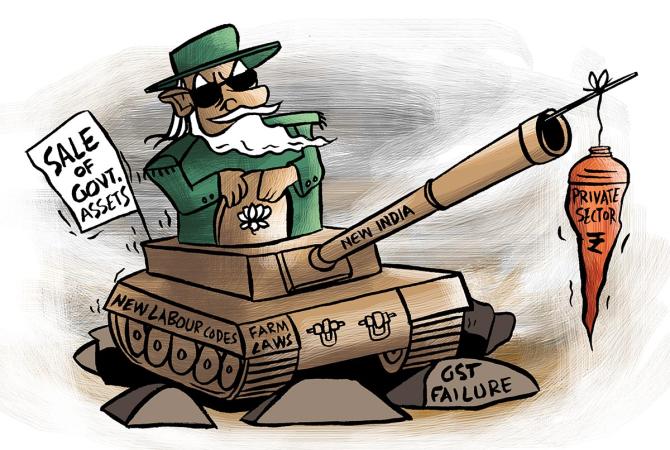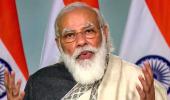The promise of a less suspicious government is surprising.
What about the disconnect between the new business stance and earlier push to dictate the narrative in politics and public life, wonders T N Ninan.

The new tack that the Narendra Modi government has spelt out on economic policy needs proper understanding, to figure out whether it will work.
For it includes not just the privatisation of government-owned companies, but also of more sectors -- like power distribution, where consumers are now promised choice of supplier.
There is the promise of a change in attitude. For, while praising wealth creators, the government has also talked of de-criminalising company and tax laws, and further de-personalising tax assessments.
This promise of a friendlier business environment and a less suspicious government has taken most people by surprise.
But the ground was prepared with the new labour codes, the proposed opening up of agricultural marketing, private sector entry into mining and rail transport, and an incentive-driven push to promote manufacturing.
Seven years after Mr Modi said the government had no business being in business, the business community senses real change.
The rediscovery of that forgotten dictum may well be born out of disappointments with past initiatives.
Because of the failure of goods and services tax to deliver what was promised, tax revenue has fallen in relation to GDP.
Non-tax revenues offer little hope of future buoyancy, given that telecom, State-owned oil companies and even the Reserve Bank of India have all been milked dry.
What else is there to do now, other than borrow to the hilt, sell companies, and monetise government assets? In other words, privatisation and the proposed monetisation of government assets have emerged from a fiscal cul-de-sac.
Other policies too have not enjoyed great success, whether in banking or making in India, in exports or overall economic growth.
So it seems the decision is to let up and let go, though that is not the natural instinct of the Modi government.
Hence the disconnect between its new stance on business and the older push for dictating the narrative when it comes to politics and public life (think media and civil society).
Market-oriented economies that seek private investment don't function very well without an array of autonomous institutions, checks on executive excess, and the freedom to express your opinion without fear.
The Modi government would find it hard to argue that this is what it has been promoting, given that even international arbitration awards don't seem to have much effect.
Against this, there is the interesting argument by Ravinder Kaur in her recent book (Brand New Nation: Capitalist Dreams and Nationalist Designs in Twenty-first Century India) that there is in fact no contradiction between right-wing politics and right-wing economics, and that the two have gone together in the creation of a new image of India.
Perhaps, but how well it might actually work remains to be seen. The results of similar experiments elsewhere have varied.
In Turkey under Recep Erdogan, the currency has collapsed amid capital flight. But in Viktor Orban's Hungary, taxes have been reduced and user charges dropped, the fiscal deficit and public debt have been controlled, and unemployment has fallen even as growth has done well.
The worst-case scenario is, of course, Vladimir Putin's Russia, with its beholden oligarchs and suppression of growing dissent amidst a non-performing economy.
At the other extreme, you could point to China, which has made a remarkable success of dealing with the contradictions of welcoming foreign investment while pursuing the repression of the Uighurs; becoming the factory to the world while Xi Jinping sidelines or imprisons his opponents or rivals in the Chinese Communist party; and laying down the law to global tech giants or shutting them out completely while still managing to gain international traction.
Some of those approaches find muted echoes in Mr Modi's India, but taking a leaf out of Beijings book is not going to work.
For one thing, China is much better at executing its plans while India has its IAS, as Mr Modi noted.
For another, protesting farmers in India can block entry points to the capital for months on end without the government even contemplating a Tiananmen-style crackdown.
If the truth is that India is fundamentally ungovernable, all that Mr Modi might achieve is a continuation of that old Indian tradition of muddling through.











